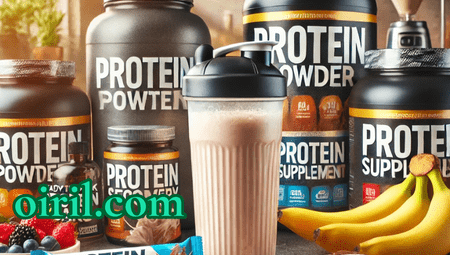In the world of fitness and bodybuilding, protein is often regarded as the cornerstone of muscle recovery and growth. For those looking to enhance their physical performance, protein supplements have become increasingly popular due to their convenience and effectiveness. This article explores the benefits of protein supplements in the context of muscle recovery and growth, the different types available, how to incorporate them into your routine, and what science has to say about their effectiveness.
Understanding Protein and Its Role in the Body
What is Protein?
Protein is one of the three macronutrients, alongside carbohydrates and fats, that are essential for maintaining a healthy body. It is composed of amino acids, which are the building blocks of muscle tissue. There are 20 different amino acids, nine of which are considered essential because the body cannot produce them and must obtain them through diet.
The Importance of Protein for Muscle Recovery
When you exercise, particularly during strength training, your muscle fibers undergo stress and small tears. This process, known as muscle damage, is a natural part of building muscle mass. After the workout, your body needs protein to repair these damaged fibers and promote muscle growth. This repair process is crucial for enhancing muscle strength and size.
Protein Synthesis
Muscle recovery and growth are heavily reliant on a process called muscle protein synthesis (MPS). MPS occurs when the rate of protein synthesis in the muscles exceeds the rate of protein breakdown. Consuming adequate amounts of protein, especially after exercise, stimulates MPS, promoting muscle repair and growth.
The Benefits of Protein Supplements
Convenience
One of the primary benefits of protein supplements is convenience. Many people lead busy lives and may find it challenging to consume sufficient protein through whole foods alone. Protein powders, bars, and ready-to-drink shakes offer an easy and quick way to increase protein intake without the need for extensive meal prep.
Enhanced Muscle Recovery
Research indicates that consuming protein supplements post-workout can significantly enhance muscle recovery. A study published in the American Journal of Clinical Nutrition found that individuals who consumed protein after resistance training experienced greater increases in muscle mass and strength compared to those who did not.
Increased Muscle Mass
Protein supplements can support increased muscle mass when combined with resistance training. A review published in Sports Medicine highlighted that protein supplementation, particularly whey protein, can lead to significant gains in muscle mass, especially in individuals who are new to resistance training or those looking to regain muscle after a break.
Improved Strength
Strength gains are closely tied to muscle mass increases. By promoting muscle recovery and facilitating muscle growth, protein supplements can help individuals achieve their strength training goals more effectively. A study published in the Journal of Strength and Conditioning Research showed that participants who supplemented with protein demonstrated greater improvements in strength compared to those who did not.
Support for Weight Management
For those looking to lose weight while maintaining muscle mass, protein supplements can be particularly beneficial. Protein is known to promote satiety, which can help individuals manage their appetite and reduce overall calorie intake. A study in the American Journal of Clinical Nutrition found that higher protein diets led to greater weight loss while preserving lean muscle mass.
Variety of Options
Protein supplements come in various forms, allowing individuals to choose what best fits their dietary preferences and needs. Options include:
- Whey Protein: Derived from milk, whey protein is quickly absorbed by the body, making it an excellent post-workout option. It is rich in branched-chain amino acids (BCAAs), which are essential for muscle recovery.
- Casein Protein: Also derived from milk, casein digests more slowly than whey, providing a sustained release of amino acids. It is often recommended for nighttime consumption to support overnight muscle recovery.
- Plant-Based Proteins: Options like pea, hemp, and brown rice protein are ideal for vegetarians and vegans. While they may have a different amino acid profile than animal-based proteins, they can still support muscle recovery and growth when consumed in adequate amounts.
Improved Nutrient Timing
Incorporating protein supplements into your post-workout routine can help optimize nutrient timing, which refers to consuming nutrients at specific times to maximize recovery and growth. Research suggests that consuming protein within 30 minutes to two hours after a workout can significantly enhance MPS and recovery.
How to Incorporate Protein Supplements into Your Routine
Post-Workout
The most common and effective time to consume protein supplements is post-workout. Aim for 20 to 30 grams of protein within two hours after your training session. This can be achieved through a protein shake or bar.
Meal Replacement
Protein supplements can also serve as meal replacements or additions to meals. For instance, blending protein powder into smoothies or oatmeal can enhance the protein content of your meals, making it easier to meet your daily protein requirements.
Snack Alternatives
Protein bars or ready-to-drink protein shakes can be convenient snacks between meals, providing a quick source of protein and helping to curb hunger.
Considerations and Potential Downsides
Not a Replacement for Whole Foods
While protein supplements can be beneficial, they should not replace whole food sources of protein entirely. Whole foods provide a wide range of nutrients, including vitamins, minerals, and fiber, that are essential for overall health.
Potential for Overconsumption
Some individuals may be tempted to consume excessive amounts of protein supplements, believing that more is better. However, it’s essential to adhere to recommended daily protein intake guidelines and consult a healthcare professional if unsure.
Digestive Issues
Certain protein supplements, particularly those containing lactose or artificial sweeteners, may cause digestive discomfort for some individuals. It’s crucial to choose a supplement that aligns with your dietary needs and preferences.
Protein supplements can play a significant role in muscle recovery and growth, particularly for those engaged in regular strength training. Their convenience, ability to enhance muscle recovery, and support for increased muscle mass make them a valuable addition to a fitness regimen. However, it’s essential to use them wisely and not as a complete replacement for whole foods.
Ultimately, maintaining a balanced diet, incorporating adequate protein from various sources, and aligning your protein intake with your fitness goals will yield the best results in your muscle recovery and growth journey. As always, consulting with a nutritionist or healthcare professional can provide personalized guidance tailored to your specific needs.



